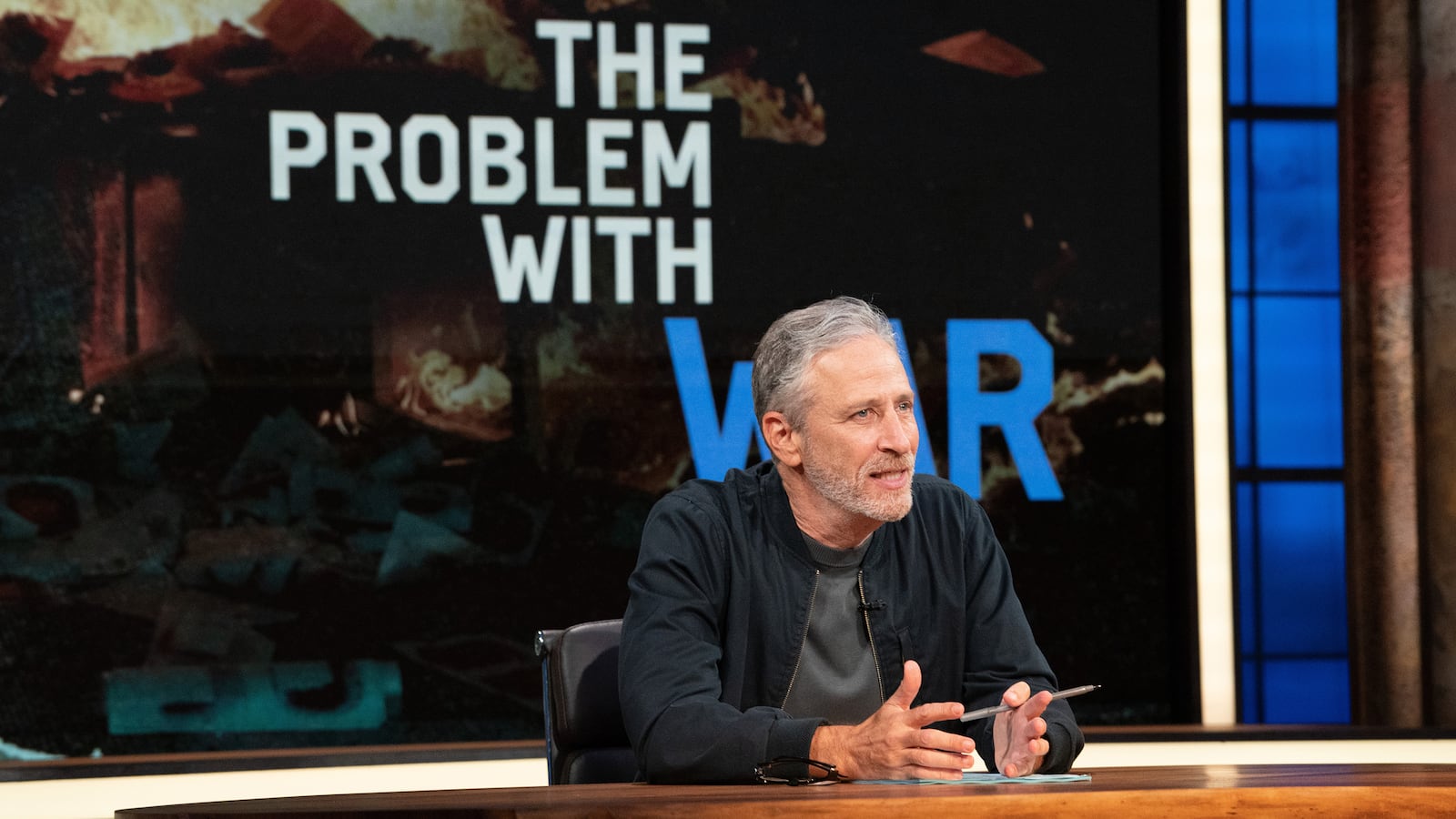In the six years since he left The Daily Show, Jon Stewart has made more appearances than anyone could have predicted on the network he once blamed for all of America’s ills, Fox News. As an advocate for causes like the health benefits of 9/11 first responders and veterans exposed to burn pits, he is always on-message, remarkably disciplined, and almost never funny.
So, as he geared up for what he has insisted is not a “comeback” on Apple TV+, the big question is which Stewart viewers would be getting. The hilariously scathing comedian who spent a decade and a half “eviscerating” his political adversaries with jokes? Or the wise elder statesman who would rather find common ground with ideological opponents for the greater good?
The titles of the first two episodes of his new show—“War” and “Freedom”—might be the first clue.
Immediately, viewers are thrust into a deadly serious writers’ room conversation about what America owes its service men and women who are sick as a result of foreign conflicts. We are behind the scenes as Stewart makes his pitch to the notably diverse room, most of whom have “never worked on a comedy show,” as showrunner and former CBS Evening News producer Brinda Adhikari explained recently.
After an opening credits sequence that cheekily runs through some alternate titles—“The Money Grab with Jon Stewart” stands out—the actual title is unveiled: The Problem With Jon Stewart. The double meaning is no doubt intentional and reveals a knowingness on his part about the challenge of building on a legacy that has bred similarly ambitious “comedy” shows like John Oliver’s Last Week Tonight, Samantha Bee’s Full Frontal, and Hasan Minhaj’s Patriot Act.
There he is, sitting behind a desk once again. A uniform of gray stubble and bomber jacket over T-shirt have replaced the clean-shaven, suited news-anchor look. When his first “joke” receives an awkward silence from a small, COVID-friendly audience, Stewart smiles and cracks, “I guess that answers whether the show will be funny or not.”
After a few more self-deprecating digs at his grizzled appearance, Stewart “eases in” with his first “bipartisan and non-controversial” topic: veterans. As he pioneered on his Daily Show, Stewart uses tight news clip montages to make his point about how America claims to “support the troops” without actually delivering on that promise.
“Yes, we love our vets,” he says. “But you know the old saying: If you love someone, let them go… fuck themselves.” That punchline is met with what can only be described as a sad chuckle.
Stewart’s single-topic format owes more than a little to the bespectacled Brit who was once seen as his natural successor on The Daily Show before Trevor Noah took the reins. But while Oliver uses fast-paced fury on his weekly HBO show to make seemingly unfunny issues like prison reform or the opioid crisis come alive, Stewart’s more deliberate and sincere version is a much bigger ask for viewers. It’s no surprise that the premiere doesn’t get any funnier when Stewart spends his second segment chatting with a group of veterans who have suffered the consequences of breathing in burn pit fumes.
Things noticeably pick up when Stewart sits down with President Biden’s Secretary of Veteran Affairs Denis McDonough, evoking some of his toughest and most substantive interviews from the Daily Show days. At one point, he goads McDonough into admitting, “I don’t give a shit what you think,” before adding, “I care what the veterans think.” The fact that it’s not punctuated by outbursts of righteous audience applause makes the conversation less viscerally thrilling but potentially more consequential. Let’s hope he gets more chances to face off with bigger political villains.
The “old” Stewart of The Daily Show comes through a bit more in the series’ second episode when he takes on the “freedom isn’t free” crowd, who refuse to wear masks or get vaccinated while at the same time comparing reasonable COVID restrictions to the Holocaust.
This leads to a genuinely funny segment called “What’s! More! Hitler!” in which the host argues that the virus itself is much more like the Nazi dictator than the methods to stop it are. “Hitler had tremendous territorial ambition. COVID is fucking everywhere!” Stewart jokes. “Masks and vaccines have barely made it to Florida. Point, COVID.”
From there, comedy takes a backseat once again for a roundtable discussion with activists and former political prisoners, including the “Egyptian Jon Stewart,” Bassem Youssef. At times, it all starts to feel more like something you might see at The New Yorker Festival as opposed to what is ostensibly a political comedy show.
When the new series’ name was revealed earlier this year, Daily Show alum Wyatt Cenac pointedly called out Stewart for appropriating both the title and concept of his canceled HBO show Problem Areas. But the irony is that both shows struggle in their own ways to find the balance between deadly serious issues and the need to deliver laughs. Turns out it’s not as easy as John Oliver and his 15 Emmys make it look.
The premiere episode ends with yet another writers’ room outtake in which Stewart frets that it’s “gonna be a fucking nightmare” when he next shows up at the Comedy Cellar table in New York because his comedian friends will make fun of him by saying, “Oh look, Mother Teresa just came in.” It’s a legitimate concern.
What made Stewart such a sensation on The Daily Show was his unique ability to mine hard laughs out of increasingly dark news cycles. Now that his many disciples are doing their own versions of that trick across network, cable and streaming TV, the bar has been raised and you can feel Stewart straining to reach over it in these first couple of episodes.
In a 2008 interview, Tina Fey was asked if she prefers applause or laughter. “Laughter. You can prompt applause with a sign,” she replied. Noting that her friend Seth Meyers coined the term “clapter,” which is “when you do a political joke and people go, ‘Woo-hoo,’” she added, “It means they sort of approve but didn’t really like it that much. You hear a lot of that on [whispers] The Daily Show.”
Watching The Problem With Jon Stewart, you get the impression that Stewart took that criticism to heart, but perhaps learned the wrong lesson. He’s no longer going for applause lines, but he’s too often leaving the humor out altogether. There are a handful of moments when he reminds us of his O.G. status in the genre he more or less created. If he can stay both relevant and—just as importantly—funny, he just might have a must-watch show on his hands again.
For more, listen and subscribe to The Last Laugh podcast.



